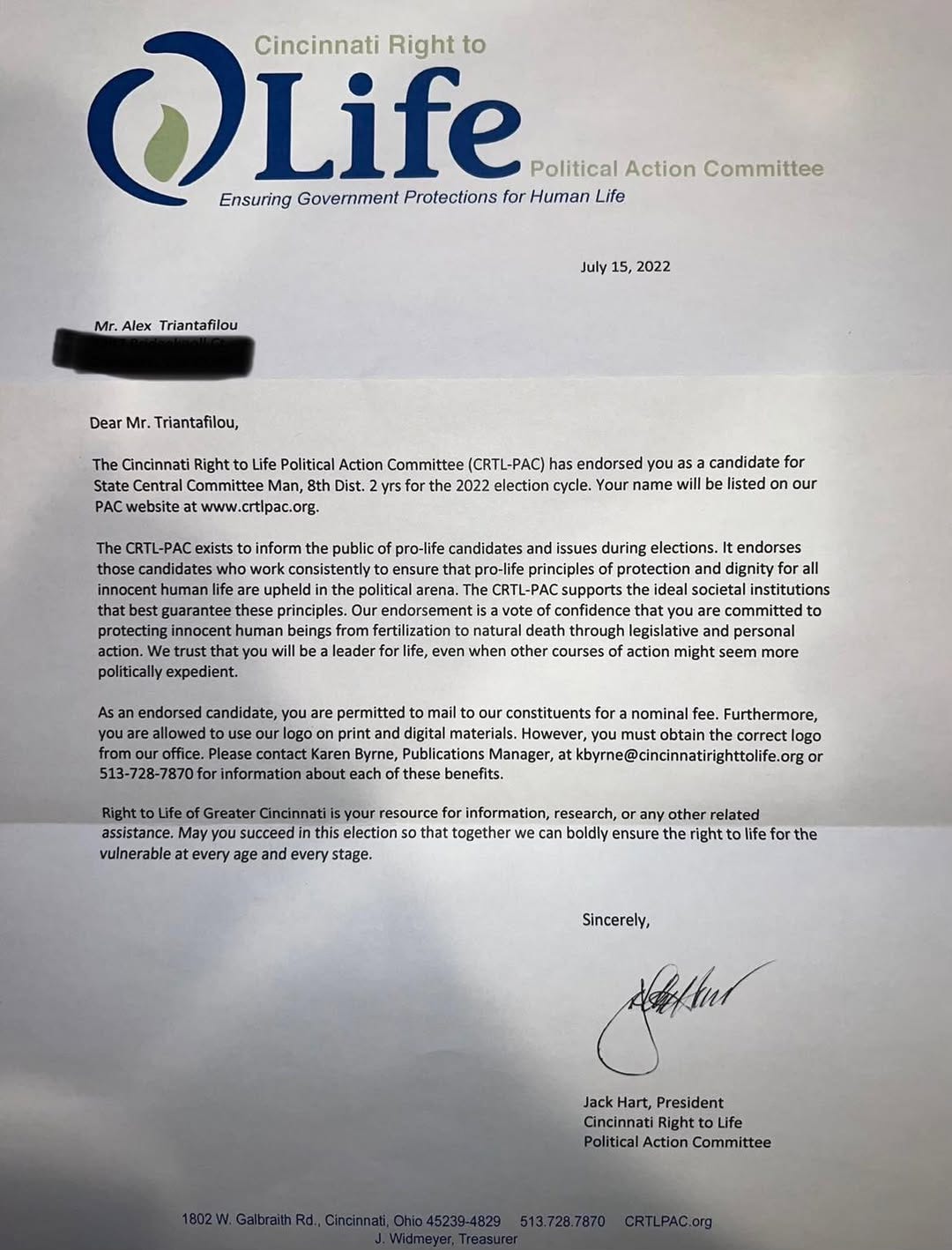Ohio Politics: A Chessboard of Moderates and Mavericks
Trump’s Dilemma in Navigating DeWine, Husted, and the Future of Ohio Conservatism
The State of Ohio, a bastion of Middle American resolve, finds itself at the center of a political maelstrom. Ohio is the President’s biggest headache, a paradoxical stronghold of conservative values helmed by moderates who seem more at home sipping lattes with Democrat coastal elites than breaking bread with blue-collar parents that embrace traditional American values. For Donald J. Trump, Ohio is a battlefield where loyalty clashes with expediency, and the stakes are nothing less than the the legacy he will leave behind.
The DeWine Conundrum
Governor Mike DeWine is a figure of irritation and necessity for Trump. A Republican by label, but a moderate by action, DeWine’s governance often forces the President to bite his tongue. Trump’s disdain is palpable, yet the pragmatic reality of political collaboration demands civility. It is an uneasy truce, bound by necessity rather than mutual respect.
DeWine’s Lieutenant Governor, Jon Husted, further complicates matters. Husted’s history with Trump is colored by acrimony, particularly over Goodyear’s infamous “woke” policies that painted all Caucasians as systemically racist. Trump, ever the defender of Middle America’s dignity, publicly criticized Goodyear, only to be undercut by Husted on the campaign trail in Ohio. The bitterness lingers, making Husted a thorn in Trump’s side.
The Ramaswamy Deal
In just the last 24 hours, the political chessboard has been set ablaze by whispers of a deal brokered in the gilded halls of Mar-a-Lago. Trump, the consummate negotiator, found himself cornered by necessity. Sources reveal that Husted, after deep deliberation, declined an immediate Senate appointment, instead opting to remain in Ohio to pursue the governorship in 2026 and due to his family’s deep roots. Despite his frosty relationship with Trump, Husted’s aspirations would benefit immensely from the President’s endorsement.
To sweeten the pot, Husted reportedly proposed an audacious trade: DeWine would appoint entrepreneur Vivek Ramaswamy to the Senate in exchange for Trump’s nod in the gubernatorial race. It is a masterstroke of pragmatism, binding disparate factions under a veneer of unity.
For Trump, the deal holds strategic appeal. A Ramaswamy Senate appointment would secure a loyal ally in Washington, untainted by the ideological compromises of Ohio’s Republican establishment. Yet, Trump’s acquiescence is begrudging. Husted, in his view, remains an unreliable figure, emblematic of a Republican Party straying from its populist roots.
Ramaswamy’s Calculations
Vivek Ramaswamy, a figure as enigmatic as he is ambitious, adds another layer of intrigue. Insiders suggest that Ramaswamy’s initial hesitation to pursue the Senate seat stemmed from his preference to remain in Ohio. For Ramaswamy, the allure of Washington is tempered by its transactional nature. A Senate seat is a stepping stone, but not the summit.
Rumors swirl of Ramaswamy’s aspirations for higher office. Some suggest he has sought Trump’s endorsement for a vice-presidential run alongside JD Vance in 2028. Others speculate about a potential Vance/Trump Jr. ticket, a union of MAGA’s intellectual and dynastic wings. These whispers, though unconfirmed, reflect the labyrinthine calculations shaping Ohio’s political future.
The Role of the ORSCC
Amid these machinations, the Ohio Republican State Central Committee (ORSCC) remains conspicuously silent. The ORSCC—tasked with reflecting the will of Ohio’s Republican voters—has increasingly become an instrument of moderation. Its leadership’s commitment to preserving the status quo often runs counter to the grassroots enthusiasm for Trump’s populist vision.
The ORSCC’s tacit endorsement of establishment candidates underscores a broader trend: the marginalization of the very base that elevated Trump to power. In a state that twice delivered resounding victories for Trump, this disconnect is stark. Ohio Republicans overwhelmingly favor a bold, unapologetic conservatism reminiscent of Ronald Reagan and even a bold America First populism.. Yet, the ORSCC’s allegiance to moderate power brokers like DeWine and Husted stifles this groundswell and the party continues to paint with those pastel colors president Reagan warned us about.
More Ohio Republican Moderatism
Traitors at the Gates
In a world where compromise often masquerades as virtue, Speaker Mike Johnson has drawn a line in the sand. His decision to remove Congressman Mike Turner as chair of the House Intelligence Committee for the 119th Congress is not a mere personnel shift; it is a bold declaration of intent. Johnson understands that the future of American conservatism demands clarity of purpose and strength of conviction, not the equivocations of moderation.
A Fresh Start for Critical Oversight
"The intelligence community and everything related to the House Permanent Select Committee on Intelligence needs a fresh start," Johnson declared, underscoring the necessity of dynamic and principled leadership. Congressman Turner, while a man of respectable service, represents a strain of Republicanism that has too often wavered in the face of critical challenges. His opposition to the resolution to censure Adam Schiff is emblematic of a cautious centrism ill-suited for the decisive oversight required in these times.
Johnson’s vision is unflinchingly clear: the Intelligence Committee must serve as an unyielding sentinel of national security. To fulfill this mandate, the committee needs leadership that is both resolute and aligned with the values of the Republican base. It is a task that Turner, for all his accomplishments, could not fully embody.
The Courage to Lead
In dismissing Turner, Johnson has demonstrated a rare quality in modern politics: the courage to act in the long-term interest of the nation rather than placating entrenched interests. His move ensures that the committee will not be burdened with leadership hesitant to confront the existential threats posed by adversaries both foreign and domestic.
Turner’s removal is not a slight on his character but a recognition that new times demand new leadership. Johnson’s decision is rooted in the understanding that loyalty to principle must take precedence over loyalty to personalities. By placing the committee’s mission above individual accolades, Johnson reaffirms the sanctity of public service as a duty to the republic.
A Commitment to Strength
For too long, moderate Republicans like Turner have sought to straddle the line between appeasing their base and courting approval from those who do not share conservative values. This balancing act has often diluted the strength of Republican leadership and allowed adversaries to exploit perceived weaknesses.
Johnson’s decision to replace Turner is a repudiation of this approach. It is a message to the Republican base that their voices matter and that their leaders will not waver in the face of opposition. By refusing to saddle President Trump’s incoming administration with a wishy-washy moderate, Johnson ensures that the Intelligence Committee will be an asset, not a liability, in advancing the conservative agenda.
A Portrait of Power: The Character of Alex Triantafilou
The hiring of Jennifer Triantafilou in 2010 as an executive assistant in Green Township is not merely a local affair. It is a mirror reflecting the intricate dance of influence, power, and character in Ohio’s very corrupt politics. At the center of this tableau stands Alex Triantafilou, a figure whose actions ripple far beyond their immediate consequences, revealing the complex interplay between principle and pragmatism. What we allow to happen at the county level indelibly reverberates to the highest levels of our party.
In the quiet corridors of Green Township’s administration, a decision was made. Ninety-nine applicants, diverse in qualifications and backgrounds, had thrown their hats into the ring. Among them were top-tier candidates, their merits marked with A-plus grades and glowing recommendations. Yet, it was Jennifer Triantafilou, a late entrant, who emerged as the chosen one. Her qualifications, while respectable, did not align with the job’s stated requirements, nor did they match the credentials of other contenders. Why, then, was she selected?
The Machinations of Power
The tale begins with whispers—a late application, a powerful husband as the leader of the Hamilton County GOP, and a recommendation that seemed to carry the weight of inevitability. Township Administrator Kevin Celarek’s desk bore the cryptic notations of directives from above: “David said hire Triantafilou,” and “Tracy → Triantafilou & job, commit political.” In these scribbled words lies the essence of the act: a decision not rooted in meritocracy but in allegiance and utility.
The fingerprints of Alex Triantafilou, then the chairman of the Hamilton County Republican Party and now chairman of the Ohio Republican Party, linger subtly on the edges of this affair. Though absent from direct communication, his presence is unmistakable. Jennifer’s application came late, spurred by Alex’s awareness of the opening. The connection is undeniable, and yet the denials are plentiful. It is a masterstroke of idiotic plausible deniability—a hallmark of those who navigate the labyrinth of political power and deceit.
The Calculus of Influence
Patronage is a relic of a bygone era, yet its specter persists, cloaked in modern decorum. The hiring of Jennifer Triantafilou is an example of this enduring practice. Critics decry the act as nepotism, a betrayal of fairness. But Alex Triantafilou, in his silence and calculated distance, embodies the pragmatist’s creed: the end justifies the means.
To dismiss this as mere cronyism is to misunderstand the nature of Alex’s character. His actions, intentional or otherwise, are rooted in a broader strategy—one that views institutions not as bastions of impartiality but as instruments of influence. For Alex, power is not a gift to be wielded lightly but a tool to be sharpened and used and exploited for his personal gain. This is not public service - this is personal service to stroke ones own ego. The Green Township episode is less an anomaly and more a reflection of a systemically corrupt political ecosystem where such decisions are the currency of survival for those of low moral character.
A Question of Character
Yet, in the shadow of pragmatism lies the question of principle. Does Alex Triantafilou’s maneuvering speak to strength or moral compromise? The answer lies in one’s perspective. To his allies, Alex’s actions demonstrate loyalty and an unyielding commitment to his network. To his detractors, they reveal a willingness to subordinate fairness and engage in political corruption to further his own interest to play with the political big boys.
Jennifer’s hiring, however, is not without its costs. To this day Jennifer remains at the job. The murmurs of discontent among township residents, the scrutiny of public records, and the tarnish on the township’s reputation all stem from a decision made in the opaque intersections of personal and political relationships. The residents who unearthed the details of this affair embody a spirit of vigilance, a reminder that democracy’s strength lies in its ability to hold power accountable.
A Ball of Wealth or a Stand for Life?
In the theater of political loyalty, truth often emerges as an unwelcome guest. Recently, supporters of Alex Triantafilou and Russell Mock have sought to silence criticism with veiled threats, unwilling to confront the stark realities of their chosen allegiances. Among these assertions is a claim that Chairman Triantafilou personally raised $1 million for an Ohio Ball in Washington, D.C., following the Republican National Convention. Let us, for the sake of argument, grant this claim as truth.
If indeed $1 million was secured for a celebratory ball, what then are we to make of the paltry $50,000 raised under his leadership in 2023 to combat abortion on-demand? This contrast is not merely a matter of accounting but a revelation of priorities. It is a vivid portrait of a leader more attuned to the desires of monied special interests than to the convictions of working-class, middle-class Republicans who cherish traditional American values.
The evidence of this dissonance does not end there. Alex Triantafilou, alongside Ohio Republican State Central Committee member Gloria Kirker, opposed the inclusion of meaningful, substantive language supporting the Right-to-Life movement in the Ohio Republican Party’s platform. Instead, they championed a tepid alternative—a hollow gesture that pays lip service to the cause while sidestepping its moral imperatives.
This is the reality of a leadership enamored with wealth and influence but divorced from principle. The question is not merely one of dollars but of values: who does Alex Triantafilou serve? The donors in their gilded ballrooms or the Republicans who look to their party for a voice, a vision, and a defense of life? The answers are evident, and they demand not excuses but accountability.










